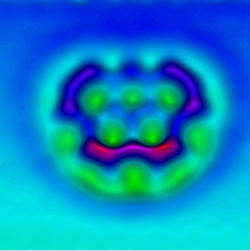As some of you will know, the Newton Institute at Cambridge is ran the programme “The Mathematics and Applications of Branes in String and M-Theory” this year.
Professor Grenville Davey is the artist-in-residence for the duration of this programme.
Grenville Davey’s sculptural work has long been concerned with relationships, familial resemblances and pairs. Through his previous residency at Queen Mary, University of London and in collaboration with Dr. David Berman (a string theorist in Queen Mary’s School of Physics), his current work continues along these lines but is now inspired by notions in T-duality and mirror symmetry in string theory where there are surprising pairings of objects.
http://www.newton.ac.uk/art/gdavey/
On Tuesday 10th July 2012 18:00-19:00, there is an open free public event in which Dr. David Berman and Prof. Grenville Davey will discuss their collaboration.
What is certainly good is that string theory and M-theory has started to permeate culture. Mathematics and physics is part of human culture. Mankind has a drive to understand the workings of the Universe, thus we have science. It is nice to see that string theory has influenced artists. This is rightly so as art should at least in part reflect the society which created it. There has been a lot of effort in understanding strings and branes, rightly or wrongly, and thus it makes sense that artists should take some inspiration here.
One thing is certain, science fiction writers have taken a lot from modern physics, and to some extent the converse is also true. I do not see why we cannot have a similar situation with more traditional art forms like paintings and sculptures.
On a personal note, I would like to try a similar collaboration with an artist myself. Being paid as a mathematical consultant for the role would be great. That said, my wife is a bit of an artist and as such I should make an effort and work on something together. If anything comes of it I will make it known via this blog.
Links
The Mathematics and Applications of Branes in String and M-Theory



 Bill Lumsden
Bill Lumsden